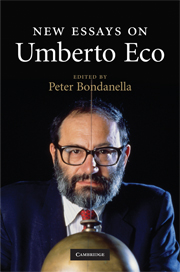Book contents
- Frontmatter
- Contents
- Notes on contributors
- Preface
- Acknowledgments
- 1 Eco and popular culture
- 2 Eco's semiotic theory
- 3 Eco's scientific imagination
- 4 From the Rose to the Flame: Ecos theory and fiction between the middle Ages and postmodernity
- 5 Eco's middle Ages and the historical novel
- 6 Eco and the tradition of the detective story
- 7 “The subject is in the adverbs.” The role of the subject in Eco's semiotics
- 8 Double coding memorabilia in The Mysterious Flame of Queen Loana
- 9 Eco and Joyce
- 10 Eco on film
- Selected bibliography on Eco
- Index
4 - From the Rose to the Flame: Ecos theory and fiction between the middle Ages and postmodernity
Published online by Cambridge University Press: 26 January 2010
- Frontmatter
- Contents
- Notes on contributors
- Preface
- Acknowledgments
- 1 Eco and popular culture
- 2 Eco's semiotic theory
- 3 Eco's scientific imagination
- 4 From the Rose to the Flame: Ecos theory and fiction between the middle Ages and postmodernity
- 5 Eco's middle Ages and the historical novel
- 6 Eco and the tradition of the detective story
- 7 “The subject is in the adverbs.” The role of the subject in Eco's semiotics
- 8 Double coding memorabilia in The Mysterious Flame of Queen Loana
- 9 Eco and Joyce
- 10 Eco on film
- Selected bibliography on Eco
- Index
Summary
Umberto Eco's fifth novel, The Mysterious Flame of Queen Loana, is by far the most autobiographical of his books, clearly referring to episodes and experiences of his Piedmontese childhood. It not only deals with personal memories of a profoundly sorrowful period in Italian history – the Fascist era and the Second world war – but also with the literature and culture of that same period. And if yambo, the protagonist of the book, is not exactly Eco, he is definitely a man to whom Eco has loaned some of his deepest memories and a man who has experienced the childhood, the education, the Italy of the thirties and forties, Fascism, the war, the Resistance movement – in summary, all the main events of Eco's generation. Like Eco, the young yambo has read The Phantom, Mandrake the Magician, Flash Gordon, and Mickey Mouse; he remembers the rhythms of Italian popular songs of the 1930s, he recognizes the soundtrack of Casablanca, he has smelled Vichy cologne, and has tasted Idrolitina selzer water.
When yambo wakes up from a coma in the very beginning of the book, he has forgotten his identity: he has lost his autobiographic or episodic memory, while he still retains his implicit memory (which registers automatisms, like brushing one's teeth) and his explicit memory (which can be both semantic – the ability to remember historical data, for example – and public – which comprises common knowledge, such as the fact that birds fly).
- Type
- Chapter
- Information
- New Essays on Umberto Eco , pp. 50 - 70Publisher: Cambridge University PressPrint publication year: 2009
- 2
- Cited by



